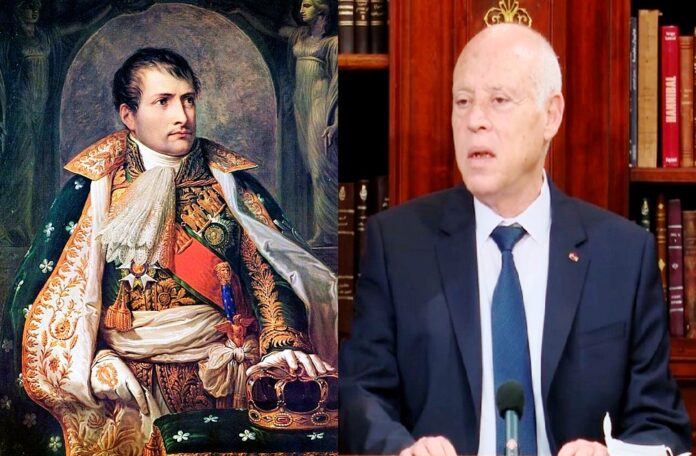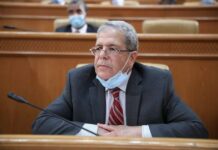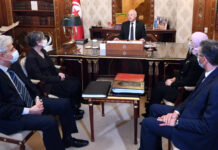By Mongi Khadraoui
What did Kais Saied do on July 25, 2021?
Has he changed the nature of the political system in Tunisia?
What are the characteristics of this historical stage?
On the evening of Sunday, July 25, 2025, Tunisian President Kais Saied announced five decisions that will remain the subject of controversy especially among professors of law and political science for decades . Relying on what was stated in Chapter 80 of the 2014 Constitution; Saied announced the suspension of the powers of the House of Representatives, the lifting of immunity from deputies, the dismissal of Prime Minister Hichem Mechichi, and the centralization of the executive authority and the public prosecution in his hands.
We are here faced with four essential conditions. The first is the centralization of the three powers in the hands of the President of the Republic, namely, the executive with its two heads, the legislative through the issuance of decrees and the judiciary by giving himself the authority of the public prosecution.
As for the second condition, it is the implementation of his decisions based on the armed forces according to his civil and military reading, i.e. the security and the army.
The third condition is the presence of unparalleled and unprecedented popular support for his decisions.
The fourth condition is the strong presence of the man’s personality if he is able to be a major candidate during the elections and if his popularity has not experienced a significant decline.
Conditions for the Formation of Bonpartism
So here we are faced with four conditions or elements that constitute in the field of political science what is known as Bonapartism, which is a theory that relies on ”presidentialist” practice and a strong executive authority with popular support and a charismatic personality. It is political tsarism.
Bonapartism for the German sociologist and philosopher Max Weber is a transitional stage between oligarchy and open democracy, which he calls liberal dictatorship.
Hannah Arendt has argued that history has not known a totalitarian system except for the Soviet Union during the era of Joseph Stalin or Germany during the era of Adolf Hitler, while the rest of the systems generally range between authoritarian and democratic systems. Another system has been added, which is the bureaucracy, but Max Weber classified it within authoritarianism.
Here one may wonder: Is Tunisia a democracy?
Democracy is based first on the will of the people in the comprehensive sense of the word.
According to the United Nations, democracy has basic elements that are considered necessary, which are respect for human rights and fundamental freedoms, freedom to join associations, freedom of expression and opinion, access to and exercise of power within the framework of the rule of law, and the organization of periodic, free and fair elections on the basis of universal suffrage and secret voting as an expression of the will of the people, creating a system for the plurality of political parties and organizations, the separation of powers, the independence of the judiciary, the provision of transparency and accountability in the public administration, and the creation of media characterized by freedom, independence and pluralism.
Is Tunisia a democracy?
As we examine the afore mentioned elements, we can notice the absence of separation of powers, the absence of the independence of the judiciary, the absence of transparency and accountability in the public administration, in addition to the absence of pluralism in the media despite the presence of the element of pluralism. As for freedom of expression and opinion, it goes hand in hand with freedom of conscience, which gives the right to freedom of belief and therefore the freedom to change it, and this is not available in Tunisia.
In addition, the Tunisian constitution imposes a religious condition for running for the presidency, as Article 74 of the January 27, 2014 constitution states that “the right to run for the post of president of the republic is the right of every female voter or voter of Tunisian nationality since birth, whose religion is Islam.”
Consequently, the constitution, which is the top of the pyramid of laws, did not give believers other than Islam from other religions the right to run for the position of President of the Republic.
In this sense, the existence of free elections with freedom of expression and a plurality in the media without pluralism and a peaceful transfer of power, does not necessarily mean that we are in a democratic state, although they are essential elements to consider it as such.
This is on the political level. On the economic and social level, wealth is not distributed equitably in Tunisia. Rather, it is subject to the factors of class, social and regional monopoly. Many shadow men and smugglers have benefited from the Ennahda movement’s control of political life since 2011, and the theory of conciliation that has been promoted, especially after 2014, has become an important entry point for informal channels for mediation and political dialogues. That, according to a report by ”Crises”, opened the doors for personal relationships and for economically and regionally influential personalities and families to play political roles and mediation.
The country also remained divided economically and socially between the various regions, as the capital and coastal cities enjoyed large and medium projects, while most of the rest of the regions, especially on the western and southern borders, live on smuggling and traditional agriculture, and the labor market is still based on discrimination between the two parts of the country. All the successive governments that have run the country since 2011 have been unable to solve the economic and social problems.
Therefore, based on the political, social and economic context, we cannot consider that Tunisia is a democratic state nor can we consider it a state with an authoritarian regime. Rather, it is in a stage of formation that may be democratic if the elements of democracy are available depending on the historical imperatives, or it may incline towards authoritarianism if those elements are lost.
Bonpartism and Kais Saied
In this sense, considering the political system from a political point of view a system similar to Bonapartism means that it is a system in between two stages. Even at the historical level, Napoleon stopped the flow of the components of a system that was inflated and aggravated and was working to return to the monarchy and abort all the elements of the French Revolution, as he dissolved the government of the directorate and installed the government of the consuls in which he combined the executive power in his hands. Bonaparte also decided to leave the Council of Five Hundred, which legislates and the Council of the Wise, which approves these legislations, which are in the place of Parliament, and then began to restore the Civil Code and the Penal Code.
Lenin considered the coup carried out by Napoleon Bonaparte on November 9, 1799 as part of the French Revolution, a stage in which the bourgeoisie came to power, and this is roughly what Karl Marx also considered. The bourgeoisie in the French Revolution is the revolutionary class that abolished feudalism, ended the domination of the Church, elevated human rights, and established political liberalism first within French society and then throughout Europe and the world.
Actually, we cannot consider Kais Saied to be similar to the military Napoleon Bonaparte, but the historical stage that Kais Saied built right now is a Bonapartist or Caesarian one, wherein the authorities gather in the hands of one person supported by the popular, militarily and security forces and has historical, political and legal legitimacy and came in response to the requirements of the stage that led to the crisis in all its structural dimensions.
Here we ask a question, did Kais Saied change the nature of the political system?
The Nature of the Political System
When we talk about the political system, we are not talking about the “System”. Rather, we are talking about the “political system” as a “political regime”, that is, its formal nature in its legal and political levels, without going into the nature of the ruling coalition that holds the means of production and wealth and the relationship of the Tunisian mode of production to global capitalism and the global financial metropol. We will only stand at the level of changing the political regime, that is, affecting the electoral system and changing the style of government from parliamentary to presidential, as well as laws and the constitution.
The general report of the Court of Auditors on the results of monitoring the financing of the electoral campaign for the premature presidential elections and the legislative elections of 2019 and the monitoring of party finances revealed the involvement of a number of personalities and parties in exceeding the funding ceiling and carrying out serious violations, considering that the law regulating elections in Tunisia, Basic Law No. 16 of 2014 on May 26, 2014 related to elections and the referendum, stipulates in its chapter 80 the prohibition of financing the electoral campaign from foreign sources, and Article 81 provides for the total ceiling of spending and campaign financing. Article 143 stipulates that the electoral commission verifies the extent to which “the winners respect the provisions of the electoral period and its financing. It may decide to cancel the results of the winners if it finds that their violation of these provisions affected the election results in a fundamental and decisive manner, and its decisions are justified.”
As for the well-known Chapter 163, it clearly states that whoever receives foreign funding loses their membership in the Assembly of the Representatives of the People, and the most dangerous thing is that they are not entitled to run in the next elections, and it was mentioned in the second paragraph: “The recipient of foreign funding is imprisoned for five years. Anyone who has been convicted of obtaining foreign funding for their electoral campaign, whether member of lists or candidates, is prohibited from running in the next legislative and presidential elections.”
Expected Actions for a Possible Historical Change
Since the President of the Republic has activated Article 80 of the Constitution, which gives him the right to declare exceptional measures in the event of an imminent threat to the entity, security and independence of the nation, which makes it impossible for the normal functioning of the wheels of the state, and to take measures necessitated by that exceptional situation, he can, in this sense, move towards the enforcement of the law Relying on the report of the Accounting Department and taking the necessary decisions on the meaning of the provisions of Articles 80, 81 and 143, especially Chapter 163, and announcing that a number of members of the Assembly of People’s Representatives have lost their membership, and thus either changing the scene in Parliament or declaring premature legislative elections..
July 25, 2021 is an important moment in the history of Tunisia, as it changed the course of political events while awaiting a change in economic and, consequently, social factors. If the measures announced by Kais Saied remain mere political measures, he will not find enough time to carry out reforms and realize the hopes of the Tunisian people.
But if he announces the change of the political system in the direction of approving a number of basic changes in the level of the economic system to strike at the monopoly lobbies, smuggling and groups that monopolize state wealth and corruption gangs, by changing the laws of the game and a legal system that has been in the service of monopolistic powers for years and announcing radical reforms in the level of health and education and the media, we can consider Tunisia as an important experimental field, which can represent a real starting point for a new humanitarian approach capable of reconsidering existing models and announcing another humanitarian attempt that may turn into a model.
Athens was just an attempt and today it is a reference.
Translated by: BM jdd & Rifi jdd











